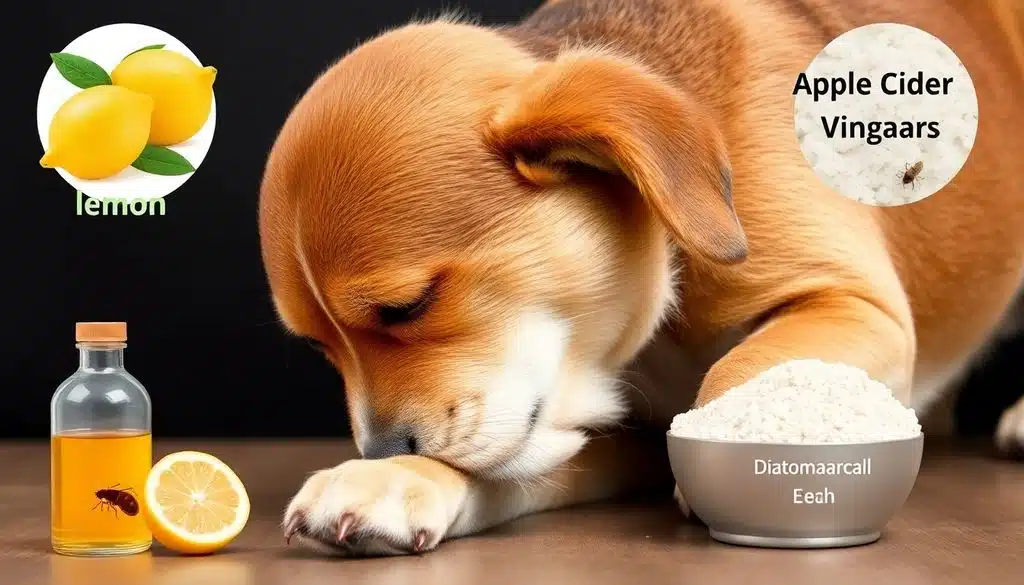Home Remedies for Fleas: Fleas are tiny, wingless insects that can cause significant discomfort and health issues for our canine companions. These parasites thrive in warm, humid environments and can quickly infest your home if left unchecked.
Table of Contents
Why Fleas are a Concern for Dog Owners
Fleas on dogs are more than just a nuisance; they can lead to serious health problems. These pesky parasites can cause:
- Allergic reactions: Some dogs are hypersensitive to flea saliva, resulting in severe itching and skin inflammation.
- Anemia: In severe infestations, fleas can consume enough blood to cause anemia, especially in puppies or small dogs.
- Tapeworms: Dogs can become infected with tapeworms by ingesting fleas while grooming.
- Skin infections: Constant scratching can lead to open wounds and secondary bacterial infections.
The Flea Life Cycle
Understanding the flea life cycle is crucial for effective control. The cycle consists of four stages:
| Stage | Duration | Description |
|---|---|---|
| Egg | 2-12 days | Laid on the host, but easily fall off into the environment |
| Larva | 5-18 days | Feed on organic debris and flea dirt (adult flea feces) |
| Pupa | 5-14 days | Develop in a cocoon, resistant to many treatments |
| Adult | 2-3 months | Feed on host blood and lay eggs |
This cycle can be completed in as little as two weeks under ideal conditions, leading to rapid population growth.
Natural Home Remedies for Fleas on Dogs

While commercial flea treatments are effective, many dog owners prefer natural alternatives. Here are some home remedies that can help control fleas on dogs:
1. Apple Cider Vinegar Solution
Apple cider vinegar (ACV) is a popular natural flea repellent. While it doesn’t kill fleas, it can make your dog less attractive to them. To use:
- Mix equal parts ACV and water in a spray bottle
- Spray the solution on your dog’s coat, avoiding eyes and open wounds
- Alternatively, add a teaspoon of ACV to your dog’s drinking water
Note: Always dilute ACV before use, as undiluted vinegar can irritate your dog’s skin.
2. Lemon Spray
Citrus fruits, especially lemons, contain d-limonene, a compound that repels and kills fleas. To make a lemon spray:
- Slice a lemon and add it to a pint of near-boiling water
- Let it steep overnight, then strain the liquid
- Pour into a spray bottle and apply to your dog’s coat, avoiding the face
This natural spray is safe for daily use and leaves your dog smelling fresh.
3. Diatomaceous Earth
Diatomaceous Earth (DE) is a natural, non-toxic powder that can effectively kill fleas by dehydrating them. To use:
- Choose food-grade DE, as other types can be harmful if inhaled
- Sprinkle a thin layer on your dog’s coat, avoiding the face
- Leave for a few hours, then brush or bathe your dog
- Apply to carpets and pet bedding, leave for 24 hours, then vacuum thoroughly
Caution: Avoid inhaling DE, as it can irritate the lungs. Consider wearing a mask during application.
Household Solutions for Flea Control
Treating your dog is only part of the battle against fleas. To effectively control an infestation, you must also treat your home environment. Here are some household solutions to complement your dog’s flea treatment:
4. Salt Treatment for Carpets
Salt is an effective and inexpensive way to combat fleas in your carpets. The salt dehydrates flea eggs and larvae, preventing them from developing into adult fleas. To use this method:
- Sprinkle a thin layer of fine table salt evenly across your carpets
- Leave the salt for 24-48 hours
- Vacuum thoroughly, disposing of the vacuum bag or contents immediately
Repeat this process weekly for best results.
Also Read: Why Does My Dog Stand On Me? 5 Possible Reasons For This Behavior
5. Essential Oil Diffusion
Certain essential oils can repel fleas due to their strong scents. Use a diffuser to spread these oils throughout your home:
| Essential Oil | Properties | Usage |
|---|---|---|
| Lavender | Calming, repellent | 5-10 drops in diffuser |
| Peppermint | Cooling, repellent | 3-5 drops in diffuser |
| Eucalyptus | Antiseptic, repellent | 5-7 drops in diffuser |
Note: Always research essential oil safety for pets before use.
Preventive Measures
Prevention is key in managing flea infestations. Implement these strategies to keep fleas at bay:
- Regularly vacuum carpets, upholstery, and pet bedding
- Wash pet bedding in hot water weekly
- Keep your lawn mowed and free of debris
- Consider using natural flea repellents in your yard
6. Regular Grooming and Bathing
Maintaining a consistent grooming routine can significantly reduce flea problems:
- Brush your dog daily with a flea comb to remove fleas, eggs, and flea dirt
- Bathe your dog every 1-2 weeks with a mild dog shampoo
- Add a few drops of tea tree oil or lavender oil to the shampoo for extra flea-repelling power
Remember to praise and reward your dog during grooming sessions to make it a positive experience.
When to Seek Professional Help
While home remedies can be effective, there are times when professional intervention is necessary. Consider consulting a veterinarian if:
- Home remedies aren’t providing sufficient relief
- Your dog shows signs of flea allergy dermatitis
- You suspect a severe infestation
- Your dog appears lethargic or unwell
Signs of Severe Flea Infestation
Be aware of these indicators that suggest a more serious flea problem:
| Sign | Description |
|---|---|
| Excessive scratching | Dog constantly scratches, bites, or licks itself |
| Hair loss | Patches of missing fur, especially around the base of the tail |
| Pale gums | May indicate anemia from flea-related blood loss |
| Flea dirt | Black specks in the fur that turn reddish when wet |
Conclusion: A Flea-Free Future for Your Dog
By implementing these home remedies and preventive measures, you can effectively manage and prevent flea infestations in your dog and home. Remember that consistency is key, and a multi-faceted approach often yields the best results. If you’re ever in doubt about your dog’s health or the severity of a flea problem, don’t hesitate to consult with a veterinary professional. With patience and diligence, you can ensure a comfortable, flea-free life for your furry friend.

